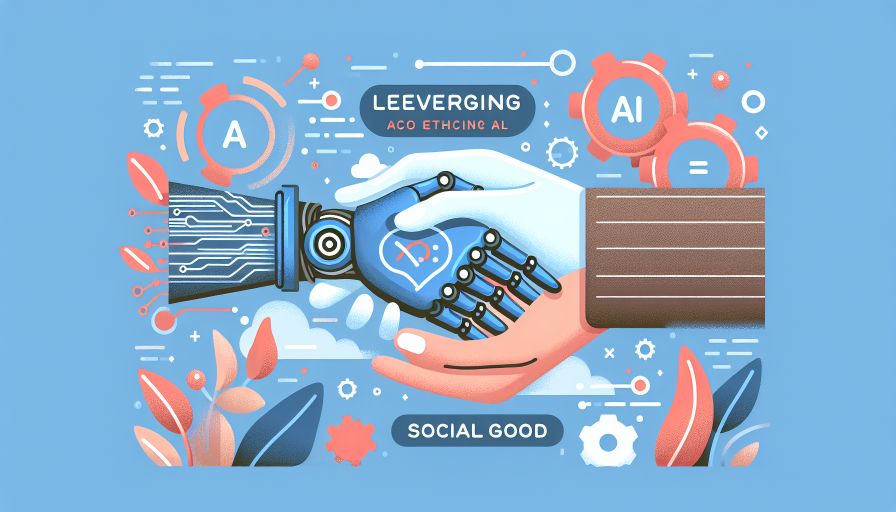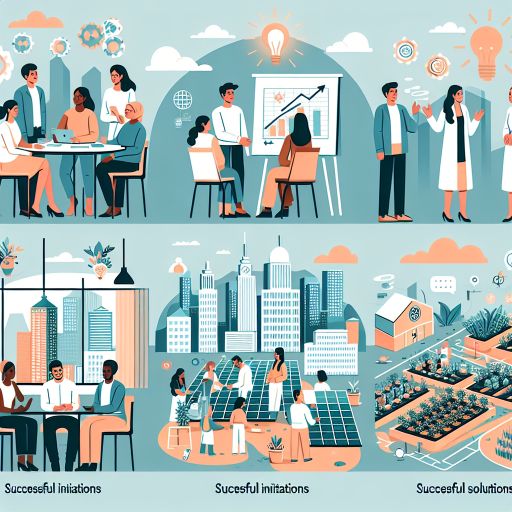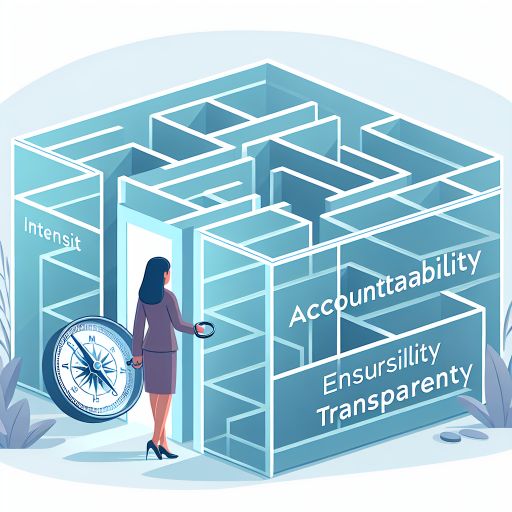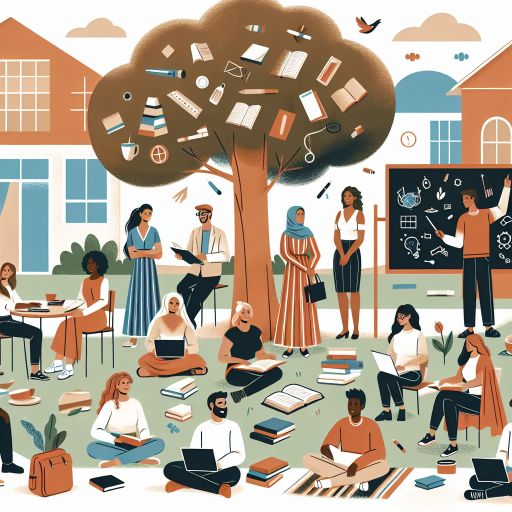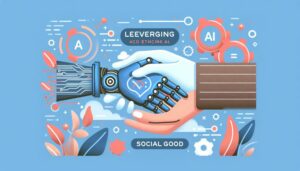Introduction to AI for Social Good: An Overview of Sabir Khan’s Vision and Mission
Artificial Intelligence (AI) has emerged as a transformative force across various sectors, and its potential for social good has become increasingly evident. Sabir Khan is a prominent figure in the AI community who has dedicated his efforts to leveraging AI for ethical and socially beneficial purposes. This chapter provides an overview of his vision and mission in the field of ethical tech development.
Sabir Khan’s vision is rooted in the belief that technology, specifically AI, should be harnessed to address societal challenges and improve the well-being of communities. He envisions a future where AI technologies are developed and deployed with a strong ethical foundation, ensuring they contribute positively to society rather than exacerbate existing disparities or create new ones.
To achieve this vision, Khan’s mission encompasses several key objectives:
- Promoting Ethical AI Development: Khan advocates for clearly defined ethical guidelines and frameworks that govern the development and deployment of AI technologies. These guidelines aim to ensure fairness, transparency, and accountability in AI systems.
- Empowering Underserved Communities: By focusing on initiatives that directly benefit underserved and marginalized communities, Khan aims to leverage AI to create opportunities and address issues such as access to education, healthcare, and economic empowerment.
- Fostering Collaboration: Recognizing the importance of collective efforts, Khan emphasizes the need for multidisciplinary collaboration among technologists, ethicists, policymakers, and community leaders. Such collaboration is essential for developing comprehensive and sustainable AI solutions.
- Advancing Public Awareness and Education: To ensure the positive impact of AI, Khan believes in spreading awareness about the ethical implications of AI and fostering a broader understanding of AI technologies among the general public. Educational initiatives are key to achieving this goal.
Sabir Khan’s approach to AI for social good is characterized by a commitment to ethical principles and a focus on tangible, real-world impact. By aligning technological advancement with social responsibility, his work aims to create a more equitable and just society through the power of AI.
Early Projects and Prototypes: The Genesis of Ethical Tech Development
Sabir Khan’s journey in the realm of ethical tech development began with a series of groundbreaking early projects and prototypes that laid the foundation for his future initiatives. These initial endeavors were critical in shaping his approach toward leveraging artificial intelligence (AI) for social good. Khan’s focus was firmly rooted in developing solutions that not only showcased technological prowess but also addressed pressing societal issues.
1. AI-Powered Disaster Response Systems
One of Khan’s earliest projects involved the creation of AI-powered disaster response systems. These systems were designed to enhance the efficiency and effectiveness of emergency responses during natural disasters. Utilizing machine learning algorithms, the prototypes could analyze large datasets in real-time to predict the impact areas of natural calamities such as earthquakes, floods, and hurricanes. This allowed for quicker deployment of resources and better coordination among response teams, ultimately saving countless lives.
2. Healthcare Accessibility Initiatives
In the healthcare sector, Khan worked on developing AI solutions aimed at improving accessibility and delivery of medical services. His projects included AI-driven diagnostic tools that could assist healthcare professionals in identifying diseases at an early stage. By leveraging data from millions of medical records, these tools were trained to identify patterns and provide accurate diagnoses, particularly in underserved areas where access to medical experts is limited.
3. Educational Technology for Underserved Communities
Khan also made significant strides in the field of educational technology. He spearheaded projects that utilized AI to create personalized learning experiences for students in underserved communities. These educational tools adapted to the learning pace and style of each student, providing customized content that addressed individual needs. This not only helped bridge the educational gap but also fostered a more inclusive learning environment.
4. Environmental Monitoring Systems
Environmental preservation was another critical area of focus for Khan. He developed AI-based environmental monitoring systems that could track changes in ecosystems and predict potential threats. These systems employed sensors and AI algorithms to collect and analyze data on air and water quality, wildlife populations, and deforestation rates. The insights gained from these systems were instrumental in informing conservation strategies and policies aimed at protecting the environment.
5. Ethical AI Frameworks
Beyond specific applications, Khan emphasized the importance of ethical AI frameworks. He worked on creating guidelines and standards to ensure that AI technologies were developed and deployed responsibly. These frameworks addressed key ethical considerations such as data privacy, algorithmic transparency, and bias mitigation. By promoting these standards, Khan aimed to foster an environment where AI could be used for the greater good without compromising ethical values.
Through these early projects and prototypes, Sabir Khan established a solid foundation for his future work in ethical tech development. His commitment to leveraging AI for social good and addressing real-world problems set him apart as a visionary in the field. Each initiative not only demonstrated the potential of AI to effect positive change but also highlighted the importance of integrating ethical considerations into technological advancements.
Key Collaborations and Partnerships: Building an Ecosystem for Ethical AI
Sabir Khan’s efforts in the realm of ethical AI development have been significantly bolstered by his strategic collaborations and partnerships with various organizations. These alliances have allowed Khan to pool resources, share knowledge, and create a robust ecosystem dedicated to leveraging AI for social good.
Collaborations with Academic Institutions
One of the noteworthy aspects of Sabir Khan’s approach has been his partnerships with academic institutions. Collaboration with universities has enabled access to cutting-edge research and young talent keen on exploring ethical AI. For instance, his partnership with the Massachusetts Institute of Technology (MIT) has resulted in numerous joint research papers and innovative projects aimed at addressing ethical concerns in AI development.
- Co-sponsored research initiatives with leading academicians
- Development of ethical AI frameworks in collaboration with scholars
- Regular workshops and symposiums on AI ethics
Partnerships with Non-Governmental Organizations (NGOs)
Another cornerstone of Khan’s ecosystem is his work with NGOs. These partnerships have been instrumental in identifying real-world problems that AI can potentially solve. Collaborating with NGOs like Amnesty International and The Red Cross has helped ensure that the deployment of AI technologies is aligned with human rights and humanitarian goals.
- Joint projects focusing on AI for disaster response
- Initiatives to use AI for monitoring and reporting human rights abuses
- Development of AI tools to aid in refugee support programs
Collaborations with Tech Companies
Partnerships with tech companies have also been a focal point of Khan’s strategy. By working with industry leaders such as Google and Microsoft, Khan has been able to leverage advanced technologies and ample resources to spearhead ambitious projects focused on ethical AI development.
- Joint development of ethical AI guidelines
- Collaborative projects on AI transparency and fairness
- Shared initiatives aimed at reducing algorithmic bias
Key Collaborative Projects
Several impactful projects have emerged from these collaborations. These initiatives focus on diverse areas such as healthcare, education, and human rights, highlighting the multifaceted approach Khan takes in ethical AI development.
| Project Name | Collaborating Entity |
|---|---|
| AI for Disaster Management | The Red Cross |
| Human Rights Monitoring Tool | Amnesty International |
| Educational AI for Underserved Communities | MIT |
| Algorithmic Fairness Initiative |
Khan’s approach to collaboration and partnership is a critical element in building an ecosystem that champions ethical AI. By aligning with a diverse array of stakeholders, from academic institutions and NGOs to leading tech companies, Khan has been able to foster an environment conducive to responsible AI development.
Case Studies of Successful Initiatives: Real-world Applications and Impact
Sabir Khan’s work in ethical tech development has been marked by numerous successful initiatives that demonstrate the practical applications of artificial intelligence (AI) in promoting social good. These initiatives span various domains, from healthcare and education to environmental conservation and public safety. By leveraging AI, Khan has pushed the boundaries of what is possible in tackling societal challenges.
Healthcare Improvement through AI
One of the standout projects has been the development of AI-driven diagnostic tools. These tools have significantly improved early detection rates of diseases such as breast cancer and diabetic retinopathy, particularly in underserved areas where access to medical specialists is limited. Utilizing machine learning algorithms, these tools analyze medical images with a high degree of accuracy, often surpassing human capabilities.
A notable example is the collaboration between Khan’s team and healthcare institutions in India, where AI-assisted workflows have reduced diagnostic errors and improved patient outcomes. This initiative not only saves lives but also reduces the burden on healthcare professionals, allowing them to focus on complex cases that require human intervention.
Educational Access and Quality
In the realm of education, Khan’s initiatives have focused on personalized learning and bridging educational gaps. AI-powered platforms have been designed to provide customized learning experiences tailored to individual student needs. These platforms assess students’ strengths and weaknesses, delivering content that optimizes learning efficiency and engagement.
An impactful project in this domain is the AI-based tutoring system implemented in public schools in various developing countries, including Kenya and Nigeria. The system has democratized access to high-quality education, ensuring that students in remote and rural areas benefit from the same educational resources as their urban counterparts.
Environmental Sustainability Efforts
Environmental conservation has also been a key focus area for Khan. AI technologies have been deployed to monitor and protect endangered species, manage natural resources, and combat climate change. For instance, AI models analyzing satellite imagery and sensor data have been used to track illegal logging activities in the Amazon rainforest, leading to more effective enforcement of conservation laws.
Moreover, AI-driven analytics have aided in optimizing agricultural practices, resulting in more sustainable farming methods that reduce resource consumption and increase crop yields. These technologies assist farmers in making data-driven decisions, ultimately supporting food security and environmental stewardship.
Public Safety Enhancement
Khan’s initiatives in public safety utilize AI for disaster response and crime prevention. AI-powered predictive models have enhanced the ability of emergency services to respond to natural disasters such as floods and earthquakes. By analyzing data from multiple sources, these models predict disaster impacts, enabling timely evacuation and resource allocation.
AI has also been pivotal in improving urban safety. Predictive policing tools, developed under Khan’s guidance, help law enforcement agencies allocate resources more effectively to areas with higher crime risks. These tools are designed to operate within ethical guidelines, ensuring respect for privacy and civil liberties while enhancing public safety.
Conclusion
These case studies highlight the transformative potential of AI when applied ethically and thoughtfully. Sabir Khan’s commitment to leveraging AI for social good has led to tangible improvements in various sectors, underscoring the importance of ethical tech development. Through these real-world applications, Khan’s initiatives continue to make a significant impact, demonstrating the power of AI to drive positive change in society.
Navigating Ethical Challenges: Ensuring Accountability and Transparency
Sabir Khan’s initiatives in ethical tech development have consistently emphasized the importance of navigating ethical challenges to ensure accountability and transparency. As AI systems become increasingly integrated into various aspects of society, addressing ethical concerns is crucial to prevent misuse and harm.
One of the primary ethical challenges is bias in AI algorithms. Even when created with the best intentions, AI systems might inadvertently perpetuate existing societal biases. Khan’s approach focuses on rigorous data audits and the inclusion of diverse datasets to minimize these biases. By collaborating with interdisciplinary teams, including ethicists, sociologists, and technologists, he ensures a holistic approach to AI development.
Another critical issue is the transparency of AI systems. Khan advocates for the development of AI that can provide clear explanations for their decisions and actions. This “explainable AI” is crucial in sectors like healthcare, finance, and law, where understanding the rationale behind decisions can have significant consequences. By promoting transparency, Khan’s initiatives help build trust between AI systems and their users.
Khan also recognizes the need for accountability in AI deployment. This involves clearly defining who is responsible for the outcomes of AI systems and ensuring that there are mechanisms for redress in cases where AI causes harm. Through his initiatives, Khan supports the establishment of robust governance frameworks that outline the responsibilities of AI developers, deployers, and users.
Privacy concerns are another major ethical challenge. To address this, Khan’s projects adhere to stringent data protection standards, ensuring that personal data is collected, stored, and used in ways that respect individuals’ privacy rights. Khan promotes the use of privacy-preserving techniques such as differential privacy and federated learning, which allow AI systems to learn from data without directly accessing it.
Additionally, Khan emphasizes the importance of engaging various stakeholders in ethical deliberations. This includes not only technologists and policymakers but also the communities affected by AI systems. By fostering inclusive dialogue, Khan’s initiatives aim to incorporate diverse perspectives and values into AI development, ensuring that the technology serves the broader public good.
Finally, Khan’s approach to ethical AI is guided by continuous monitoring and evaluation. AI systems are dynamic and evolve over time, so it’s essential to regularly assess their performance and impact. Khan’s initiatives include ongoing audits and impact assessments to identify and mitigate potential ethical issues as they arise.
In summary, Sabir Khan’s commitment to ethical AI development involves a comprehensive strategy to navigate the complex ethical challenges of AI implementation. By prioritizing bias mitigation, transparency, accountability, privacy, stakeholder engagement, and continuous evaluation, Khan’s initiatives strive to create AI systems that are fair, trustworthy, and beneficial for society.
Policy Advocacy and Legal Frameworks: Shaping the Future of Ethical AI
Policy advocacy and legal frameworks are crucial components in the realm of ethical AI development. Sabir Khan has recognized the importance of establishing robust policies and legal structures to ensure that AI technologies are developed and deployed responsibly. His initiatives in this area have focused not only on creating guidelines for ethical AI but also on influencing policy at national and international levels.
One significant effort led by Khan is his participation in the drafting of ethical AI guidelines for various international organizations. He has worked with bodies such as UNESCO and the European Commission to contribute to the formation of AI policies that prioritize human rights and ethical considerations. These collaborations have resulted in key documents that set out principles for the responsible use of AI, such as transparency, accountability, and fairness.
Additionally, Khan has been an active advocate for legislative measures aimed at regulating AI technologies. He has engaged with policymakers to push for the implementation of laws that govern AI development and deployment. For example, his efforts have been instrumental in the introduction of data protection laws that safeguard user privacy and prevent misuse of AI-driven surveillance technologies.
To support these legislative efforts, Khan has also invested in research that explores the intersection of AI, law, and ethics. This research has provided evidence-based recommendations that inform policy decisions. It has covered areas such as the implications of AI on labor markets, the potential biases in machine learning algorithms, and the ethical dilemmas posed by autonomous systems.
Another aspect of Khan’s work in this domain is his involvement in educational initiatives that aim to raise awareness about the legal and ethical aspects of AI. He has organized workshops and seminars for stakeholders, including lawmakers, industry leaders, and academics, to discuss and develop actionable strategies for ethical AI governance. These events have been pivotal in creating a shared understanding of the urgent need for ethical frameworks in AI development.
The impact of Khan’s policy advocacy is evident in the increasing global discourse on AI ethics. His contributions have helped to shape a more conscientious approach to AI policy-making, ensuring that ethical considerations are at the forefront of technological advancement. As the field of AI continues to evolve, Sabir Khan’s work remains a guiding force in promoting policies that balance innovation with the imperative to protect societal values and individual rights.
In summary, Sabir Khan’s initiatives in policy advocacy and legal frameworks have been instrumental in shaping the future of ethical AI. Through collaborative efforts, legislative advocacy, research contributions, and educational outreach, Khan has made significant strides in promoting responsible AI development on a global scale.
Community Engagement and Education: Spreading Awareness and Building Capacity
Community engagement and education are critical components of Sabir Khan’s initiatives in developing ethical AI technologies. A sustained effort in these areas ensures that the benefits of AI are widely understood and accessible, and helps in building a foundation for a responsible tech culture.
Outreach Programs
Khan has spearheaded numerous outreach programs aimed at engaging various community stakeholders. These programs include seminars, workshops, and public forums aimed at demystifying AI and its implications. The goal is to foster a more informed public discourse around AI technologies and ethical considerations.
- AI and Society Seminars: Regularly held to discuss the role of artificial intelligence in societal development, focusing on benefits as well as potential drawbacks.
- Public Workshops: Hands-on sessions designed to demystify AI for non-specialists, covering basics of machine learning, data ethics, and privacy concerns.
- Community Forums: Open platforms for local communities to express their concerns and expectations about AI applications in their daily lives.
Educational Initiatives
To equip the next generation with the skills and knowledge necessary for a future dominated by AI, Khan has implemented a series of educational initiatives. These efforts target diverse age groups and educational levels, ensuring inclusivity and broad reach.
- School Programs: AI literacy courses introduced in primary and secondary schools to cultivate early interest and understanding of ethical AI.
- University Collaborations: Partnerships with higher education institutions to develop curricula focused on AI ethics, policy, and technical skills.
- Online Courses and Resources: Free and accessible online modules designed for self-paced learning on various aspects of AI and ethics.
Community Partnerships
Recognizing that meaningful community engagement requires more than just outreach and education, Khan has also focused on building lasting partnerships with community organizations. These partnerships aim to ensure that marginalized and underrepresented groups have a voice in AI development and deployment.
- Non-Profit Collaborations: Alliances with NGOs to address specific social issues using AI solutions, such as health monitoring systems for underprivileged areas.
- Local Government Initiatives: Joint projects with municipalities to integrate ethical AI in public services, from urban planning to welfare distribution.
- User-Centric Design: Engaging community members as co-designers in tech projects, ensuring solutions are tailored to real-world needs.
Conclusion
By focusing on community engagement and education, Sabir Khan has laid a solid groundwork for a participatory approach to ethical AI development. These efforts not only spread awareness but also build capacity, ensuring that the community is an active participant in shaping the future of technology.
Future Prospects and Continuing Impact: The Legacy of Sabir Khan’s Work
As we look towards the future, it is crucial to acknowledge the continuing impact and potential growth areas of Sabir Khan’s work in leveraging AI for social good. His initiatives have set a foundation for future ethical tech development that extends beyond initial projects and collaborations.
Advances in AI Research and Development
One significant area of future growth is the advancement in AI research and development. With ongoing investments and focus, numerous breakthroughs in machine learning and deep learning algorithms are expected. These advancements will likely provide even more robust solutions for social issues, from healthcare to environmental sustainability.
Sabir Khan’s initiatives have emphasized the importance of building ethically-aligned AI systems. Moving forward, research will continue to prioritize transparency, fairness, and accountability in AI model development. This approach will ensure that AI technologies are not just innovative but also trustworthy and aligned with societal values.
Scaling Successful Models
Another promising aspect of future prospects is the scaling of successful models. The real-world applications tackled by Khan’s initiatives have demonstrated the potential for positive impact. By scaling these models, there is an opportunity to reach a larger audience and tackle more complex issues. This includes expanding healthcare diagnostics tools to underserved communities and enhancing environmental monitoring systems globally.
The scaling efforts will also benefit from the existing collaborative ecosystem that Khan has built. Leveraging partnerships with academia, industry leaders, and policymakers ensures the scalability is supported by a strong network of stakeholders committed to ethical AI.
Education and Skill Development
Expanding education and skill development programs are crucial for the long-term sustainability of ethical AI. Sabir Khan’s commitment to community engagement and education highlights the need to train the next generation of AI developers and users. Future efforts should focus on creating inclusive educational programs that provide access to AI knowledge and skills for a diverse audience.
Bridging the gap between advanced AI concepts and practical, ethical applications will empower more individuals and communities to participate in the AI revolution. This democratization of AI knowledge can drive widespread social good.
Global Policy and Ethical Standards
As AI technologies continue to evolve, so does the need for robust global policies and ethical standards. Khan’s work has laid the groundwork for advocating these policies, but continued efforts are needed to influence international frameworks effectively. Future prospects involve active engagement in policy dialogue at global forums, such as the United Nations and the World Economic Forum, to ensure a unified approach to ethical AI development.
Collaborative efforts among nations can lead to the establishment of common guidelines that prioritize human rights, data privacy, and ethical implementation. This can prevent misuse and ensure that AI serves as a tool for global good.
Conclusion: A Legacy of Ethical Tech Development
Sabir Khan’s initiatives in leveraging AI for social good have created a solid foundation for future ethical tech development. The ongoing impacts of his work are evident in the advancements in AI research, the scalability of successful models, educational outreach, and policy advocacy. Looking ahead, the continued focus on these areas promises to uphold and expand his legacy, ensuring that AI remains a force for positive societal transformation.

